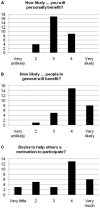Participants' Perceptions of Deep Brain Stimulation Research for Treatment-Resistant Depression: Risks, Benefits, and Therapeutic Misconception
- PMID: 26225215
- PMCID: PMC4516276
- DOI: 10.1080/21507716.2011.627579
Participants' Perceptions of Deep Brain Stimulation Research for Treatment-Resistant Depression: Risks, Benefits, and Therapeutic Misconception
Abstract
Background: Deep brain stimulation (DBS) for treatment-resistant depression (TRD) is the focus of great interest and numerous studies. Given the state of this research, the risks of DBS, the uncertainty of direct benefits, and the potential for therapeutic misconception (TM), examination of research participants' perspectives is critical to addressing concerns about the adequacy of consent among people with TRD.
Methods: Among 31 participants considering DBS studies at two sites, self-report questionnaires were used to examine three dimensions of TM (eight true/false items). Additional Likert-scale items assessed perceptions of risks, potential benefits, and altruistic motivations.
Results: Participants correctly identified the surgery itself as the riskiest study procedure, although only four participants rated the surgery as "high risk." Most participants rated the entire DBS study as "moderate" or lower risk. Participants rated the likelihood of others benefiting in the future more strongly than they did the likelihood of personal benefit. Participants held positive attitudes toward research, and were moderately altruistic. Nearly two-thirds of the 31 participants (64.5%) answered at least one of the true/false TM items incorrectly.
Conclusions: Individuals considering DBS studies for TRD demonstrated reasonable perceptions of risks and benefits, distinguished among procedural risks, and expressed hopes for personal benefit as well as altruism. Findings related to TM were mixed: Participants understood the experimental stage of DBS for depression and endorsed the possibility of no personal benefit, yet there was some evidence for TM. Although these findings are reassuring, investigators must nevertheless remain vigilant about identifying and addressing potential misconceptions.
Keywords: informed consent; major depression; research benefits; research risks; therapeutic misconception.
Figures


Similar articles
-
The ethics of research on deep brain stimulation for depression: decisional capacity and therapeutic misconception.Ann N Y Acad Sci. 2012 Aug;1265:69-79. doi: 10.1111/j.1749-6632.2012.06596.x. Epub 2012 Jul 19. Ann N Y Acad Sci. 2012. PMID: 22812719 Free PMC article.
-
Enrolling in deep brain stimulation research for depression: influences on potential subjects' decision making.Depress Anxiety. 2012 Feb;29(2):139-46. doi: 10.1002/da.20916. Epub 2011 Nov 17. Depress Anxiety. 2012. PMID: 22095837
-
Ethical Issues in Deep Brain Stimulation Research for Treatment-Resistant Depression: Focus on Risk and Consent.AJOB Neurosci. 2011;2(1):29-36. doi: 10.1080/21507740.2010.533638. AJOB Neurosci. 2011. PMID: 26229726 Free PMC article.
-
Deep brain stimulation for treatment-resistant depression: an integrative review of preclinical and clinical findings and translational implications.Mol Psychiatry. 2018 May;23(5):1094-1112. doi: 10.1038/mp.2018.2. Epub 2018 Feb 27. Mol Psychiatry. 2018. PMID: 29483673 Review.
-
A systematic review and meta-analysis of deep brain stimulation in treatment-resistant depression.Prog Neuropsychopharmacol Biol Psychiatry. 2018 Mar 2;82:224-232. doi: 10.1016/j.pnpbp.2017.11.012. Epub 2017 Nov 13. Prog Neuropsychopharmacol Biol Psychiatry. 2018. PMID: 29146474
Cited by
-
Negative association of perceived risk and willingness to participate in innovative psychiatric research protocols.J Psychiatr Res. 2020 Mar;122:9-16. doi: 10.1016/j.jpsychires.2019.12.010. Epub 2019 Dec 18. J Psychiatr Res. 2020. PMID: 31891880 Free PMC article.
-
The ethics of research on deep brain stimulation for depression: decisional capacity and therapeutic misconception.Ann N Y Acad Sci. 2012 Aug;1265:69-79. doi: 10.1111/j.1749-6632.2012.06596.x. Epub 2012 Jul 19. Ann N Y Acad Sci. 2012. PMID: 22812719 Free PMC article.
-
Views about neuromodulation interventions for depression by stakeholder group, treatment modality, and depression severity.Compr Psychiatry. 2023 Apr;122:152365. doi: 10.1016/j.comppsych.2023.152365. Epub 2023 Jan 20. Compr Psychiatry. 2023. PMID: 36702062 Free PMC article. Clinical Trial.
-
Personal and relational changes following deep brain stimulation for treatment-resistant depression: A prospective qualitative study with patients and caregivers.PLoS One. 2023 Apr 6;18(4):e0284160. doi: 10.1371/journal.pone.0284160. eCollection 2023. PLoS One. 2023. PMID: 37023074 Free PMC article.
-
Autonomy in Depressive Patients Undergoing DBS-Treatment: Informed Consent, Freedom of Will and DBS' Potential to Restore It.Front Integr Neurosci. 2017 Jun 8;11:11. doi: 10.3389/fnint.2017.00011. eCollection 2017. Front Integr Neurosci. 2017. PMID: 28642690 Free PMC article.
References
-
- Appelbaum PS, Grisso T. MacCAT-CR: MacArthur Competence Assessment Tool for Clinical Research. Professional Resource Press; Sarasota, FL: 2001.
-
- Appelbaum PS, Lidz CW, Grisso T. Therapeutic misconception in clinical research: Frequency and risk factors. IRB. 2004;26(2):1–8. - PubMed
-
- Appelbaum PS, Roth LH, Lidz. C. The therapeutic misconception: informed consent in psychiatric research. International Journal of Law and Psychiatry. 1982;5(3–4):319–329. - PubMed
-
- Appelbaum PS, Roth LH, Lidz CW, Benson P, Winslade W. False hopes and best data: Consent to research and the therapeutic misconception. Hastings Center Report. 1987;17(2):20–24. - PubMed
-
- Bell E, Mathieu G, Racine E. Preparing the ethical future of deep brain stimulation. Surgical Neurology. 2009;72(6):577–586. - PubMed
Grants and funding
LinkOut - more resources
Full Text Sources
